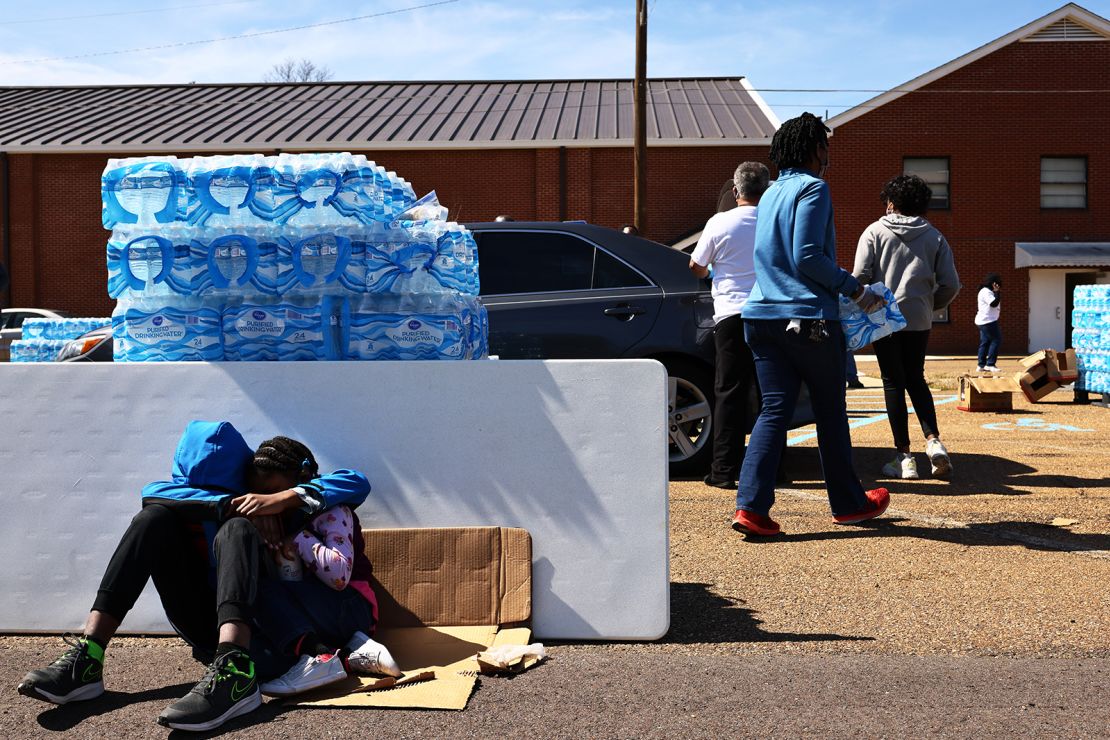Editor’s Note: Keri Leigh Merritt is a historian, writer and filmmaker from Atlanta. She is the author of “Masterless Men: Poor Whites and Slavery in the Antebellum South.” Follow her @KeriLeighMerrit. The views expressed here are her own. View more opinion on CNN.
Summoned to the South by Marian Wright of the NAACP, Senators Robert F. Kennedy and Joseph Clark traveled to the Mississippi Delta in the Spring of 1967 to assess the effectiveness of the federal War on Poverty programs. Wright had testified before Congress that the people of her state were starving and in agony. Although forewarned, the White senators were stunned to witness the extremities of Mississippi’s soul-crushing poverty, right in the middle of one of the wealthiest nations on earth.

After repeated attempts to engage one young, seemingly non-verbal African American boy – his stomach swollen from malnourishment – picking through dried rice and beans on the dirt floor of a shack, Bobby Kennedy, the father of 11 children, quickly turned and walked outside. He did not want the photographers who accompanied him to catch the tears welling up in his eyes.
The depth of Mississippi’s poverty was almost too much for Kennedy to bear. Speaking mournfully about “children with distended stomachs,” Kennedy urged the federal government to do something to alleviate the state’s widespread “suffering.” Deeming “housing inadequate” and commenting on the “insufficient clothing” of the state’s impoverished children, he rightfully concluded that Mississippi was a “terrible reflection on our society.”
Now, 54 years later, it is necessary to ask the federal government to intervene in the state again. Many of the primarily Black residents of Mississippi’s capital, Jackson, spent weeks without running water after a cold spell burst a huge number of the city’s pipes. According to Mississippi Today, over 40,000 people, the equivalent of a sold-out game at Wrigley Field, were not able to drink, bathe or wash clothes, dishes, hands or even flush toilets – all during a pandemic.

Over the past several days, the city has made significant progress in repairs, restoring water to most of its residents. However, two major, potentially deadly issues remain. First, the water pressure is extremely low and unreliable in certain neighborhoods, particularly in the poorer parts of south Jackson. More importantly, city testing has revealed that the water in Jackson is still unsafe to drink, as USA Today reported, “because of high turbidity – cloudiness that increases the possibility water might contain disease-causing organisms.”
The capital of an American state is still under a boil-water advisory – an advisory originally issued nearly a month ago, on February 16. Jackson’s problems, like those of so many other US towns and cities, are a blight on the political ideals White Americans traditionally claim.
Jackson, Mississippi, is a microcosm of our nation’s massive failures to make amends for centuries of colonialism, slavery and racism. The story of Jackson is like those of Flint, Michigan; Centreville, Illinois; and Shreveport, Louisiana. While the details from each city may vary, the core issue that binds these places together in anguish is painfully obvious.
Our problem, our shame, is that American poverty springs not from lack of funds, but instead from White supremacy. Due to the ravages of history – from slavery and the failures of Reconstruction to more modern tactics of redlining, White flight and the crisis of mass incarceration – poverty in America is almost always dependent on racism, even when the impoverished are White. From pitting laborers of different races against each other to stoking racist and xenophobic fears through a sensationalistic and profit-driven media, America’s White elite have always used the specter of racism to prevent the formation of a broad coalition of people with similar class interests, regardless of race.
And poor and working-class whites historically have been all-too-willing to join in this Faustian bargain.
We are one of the richest nations in the world, but among those nations, we are one of the most unequal. Nearly all other developed nations offer a better standard of living to their citizens, regardless of income or wealth.
Currently, White Republicans control Mississippi’s state legislature. As Mississippi Free Press reported, Governor Tate Reeves and other White lawmakers are essentially holding the Black-led, Black-populated city hostage, refusing to fund repairs. While the citizens of his state are literally going on a month without the very basics of survival, Reeves instead focused his attention to passing the nation’s first anti-transgender law of 2021.
The few repairs that have been made have mostly been in affluent, largely White north Jackson, clearly delineating not just the privileges, but the power of Whiteness. As State Representative Christopher M. Bell rightly told me, “My colleagues at the Mississippi Capitol have a history of accusing the City of Jackson’s legislative delegation of asking for handouts versus help. They however have a different view of the predominantly White communities surrounding Jackson when they request support.”
Jackson’s Mayor Chokwe Antar Lumumba echoed Representative Bell’s sentiments, knowing all too well how the state’s long and sordid history has kept Black and brown citizens trapped in cyclical poverty, often without access to services most Americans believe are basic human rights – from running water and electricity to housing, health care and food.
“The infrastructure challenges in Jackson and in similar Black communities across the country are inextricably linked to a legacy of racism, redlining, gerrymandering and systematic disinvestment in our communities over decades,” Mayor Lumumba wrote in a statement Saturday. “It has compounded over time and now we must reconcile with how we fix it and find solutions forward. We must move away from a system of exclusion and exploitation, and towards a just city model.”
The mayor’s words ring true: According to Talk Poverty, as of 2020, nearly one-fifth of Mississippi’s total population have incomes below the poverty line. The burden is even worse for the state’s children, of whom an astounding 28% live in daily poverty. Among US states and the District of Columbia, Mississippi ranks dead last – 51st – for overall poverty.
Other Talk Poverty statistics reveal the staggering correlation between race and poverty. While 12% of Mississippi’s White population lives in poverty, the numbers rise to close to 30.5%, 31% for African Americans and 32% for Native Americans.
As if the misery of a state awash in destitution, pain and suffering was not enough, Mississippi also has the odious distinction of ranking 49th in unemployment, 44th in higher education attainment, 50th in teen birth rate, 49th in assets and savings and 51st, dead last once again, for hunger and food insecurity.
To make matters even worse, nearly a quarter of the state’s population had no health insurance at any time during 2020’s pandemic. Simply put, Mississippi is one of the poorest, sickest states in the US.
Although reparate is no longer a common word, it is the key to successfully addressing reparations. To reparate means to restore something to a state of good repair; it means returning something to working order. Reparative justice means to right the wrongs of the past – not only by acknowledging the harms of certain groups of people both in the past and the present, but also addressing those harms and working to ameliorate them.
As Nina Simone so brilliantly wrote about reparative justice in her iconic song “Mississippi Goddam,” time is always of the essence:
But that’s just the trouble
“do it slow”
Desegregation
“do it slow”
Mass participation
“do it slow”
Reunification
“do it slow”
Do things gradually
“do it slow”
But bring more tragedy.
While many White Mississippians in power like Tate Reeves and other GOP leaders – wittingly or not – extend the legacies of racism and the slaveholders’ Confederacy and fail to act as White supremacy keeps state’s people ensnared in extreme poverty, the time for federal intervention is now. If the leaders of the state will not repair and restore Jackson’s water system, then the leaders of the country must step in to help right the wrongs of the past.
From immediately sending FEMA in to deal with Jackson’s short-term problems to passing a Federal Jobs Guarantee that focuses, first and foremost, on reparative justice, the Biden administration and the Democratic Congress – if they truly espouse the values they campaigned upon – should act swiftly and thoroughly.
In 1968, less than a year after Senator Kennedy’s Mississippi trip, Martin Luther King, Jr. wrote that “There is nothing new about poverty. What is new is that we now have the techniques and the resources to get rid of poverty. The real question is whether we have the will.”
It is nothing short of a moral and ethical tragedy – an indictment of the entire country – that our citizens are being deprived of clean running water in one of the richest nations on earth. It is well past time for immediate federal action. We must have the will.
Mississippi Goddam.




